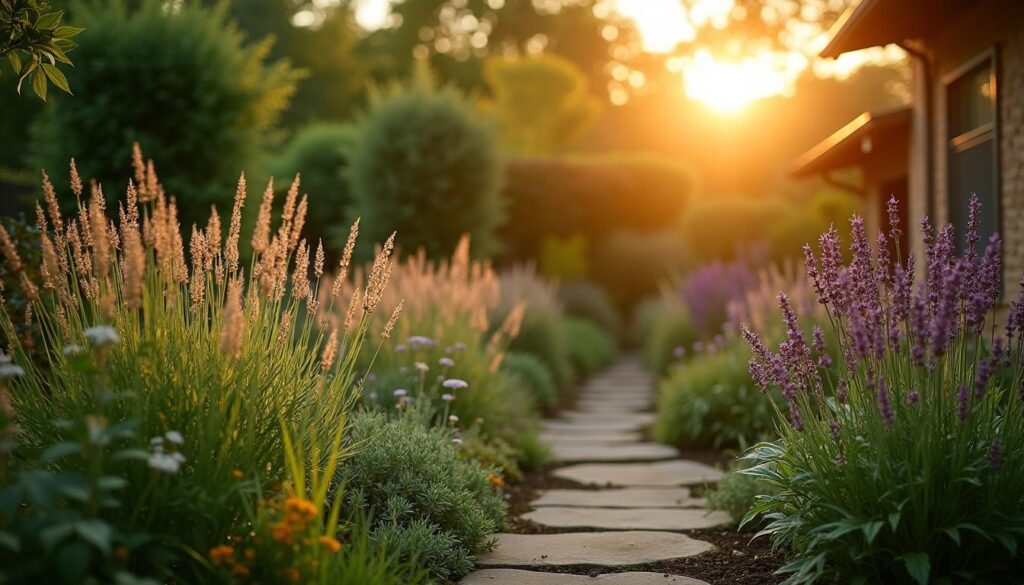
Are pesky mosquitoes ruining your backyard fun? Nobody likes dealing with itchy bites or constantly swatting away bugs during outdoor gatherings.
Nature has provided us with a beautiful solution – plants that naturally repel mosquitoes! 🌿
These mosquito repelling plants not only look gorgeous and smell amazing, but they’ll help keep those annoying bugs at bay all season long.
Here’s a list of 15 gorgeous, easy-to-grow plants that can transform your outdoor space into a mosquito-free sanctuary!
How Mosquito Repelling Plants Support a Healthier, Eco-Friendly Garden
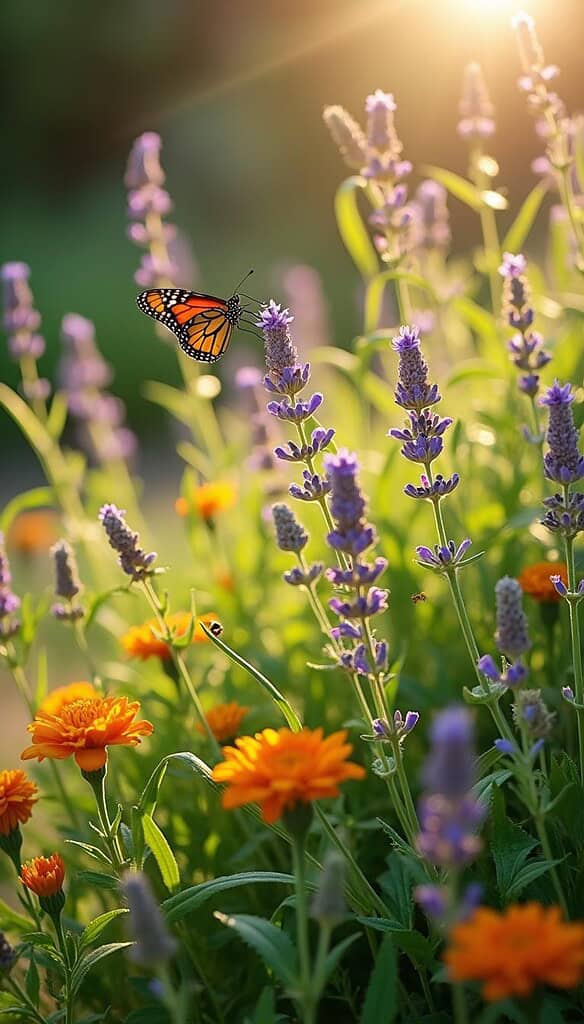
Tired of spraying chemicals all over yourself and your yard? There’s a better way!
Mosquito repelling plants work by releasing natural compounds into the air that bugs simply can’t stand.
These natural insect deterrents create an invisible shield around your outdoor spaces without any of those harmful chemicals.
Well-placed mosquito repelling plants create a natural barrier around the areas you use most.
How natural pest control supports eco-friendly gardening
When you choose natural pest control with mosquito repelling plants, you’re doing more than just keeping mosquitoes away – you’re supporting a healthier ecosystem. 🌎
Chemical sprays don’t just target mosquitoes; they can harm beneficial insects like bees and butterflies that our gardens need to thrive.
Natural mosquito repelling plants create balance in your garden by deterring pests while still providing habitat for helpful pollinators.
❓ Did You Know: Many mosquito repelling plants also attract natural mosquito predators like dragonflies, birds, and bats – creating your own backyard pest control team!
Benefits of using anti-mosquito plants instead of sprays
There are so many reasons to choose mosquito repelling plants over chemical sprays:
- They’re safer for pets and children (no toxic chemical exposure) 🐾👶
- They look beautiful and enhance your garden design
- Many provide lovely scents that humans enjoy (while bugs hate them!)
- Most are perennials that come back year after year (one-time investment)
- Several double as cooking herbs, giving you multiple benefits
🔍 Consider This: Chemical repellents need constant reapplication and can be expensive over time, while mosquito repelling plants provide continuous protection once established.
Best Mosquito Repelling Plants for Your Yard
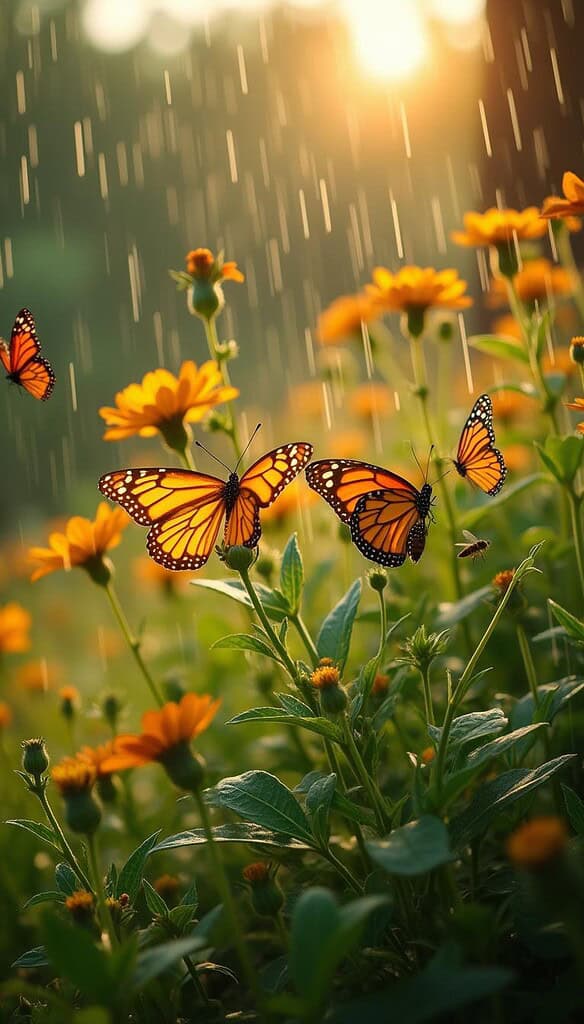
Now let’s explore the most effective mosquito repelling plants you can add to your garden.
1. Citronella (classic bug repellent plant)
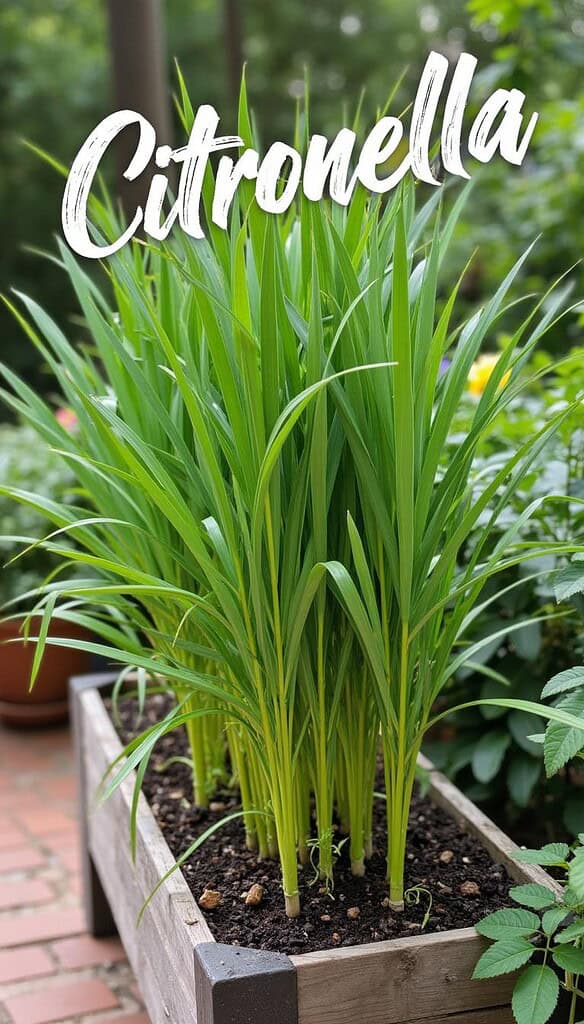
You’ve probably heard of citronella candles, but did you know you can grow the actual plant?
True citronella (Cymbopogon nardus) produces a strong lemony scent that masks the human smells mosquitoes are attracted to.
✋🏼 To boost its mosquito-repelling power, lightly crush the leaves to release more of the natural oils into the air.
This tropical grass grows 5–6 feet tall in the right conditions and makes a stunning statement in any garden.
💡 Pro Tip: While true citronella plants work best, “mosquito plant” geraniums (Pelargonium citrosum) are easier to grow in cooler climates and still offer some mosquito-repelling benefits.
2. Lavender (smells amazing + repels insects)
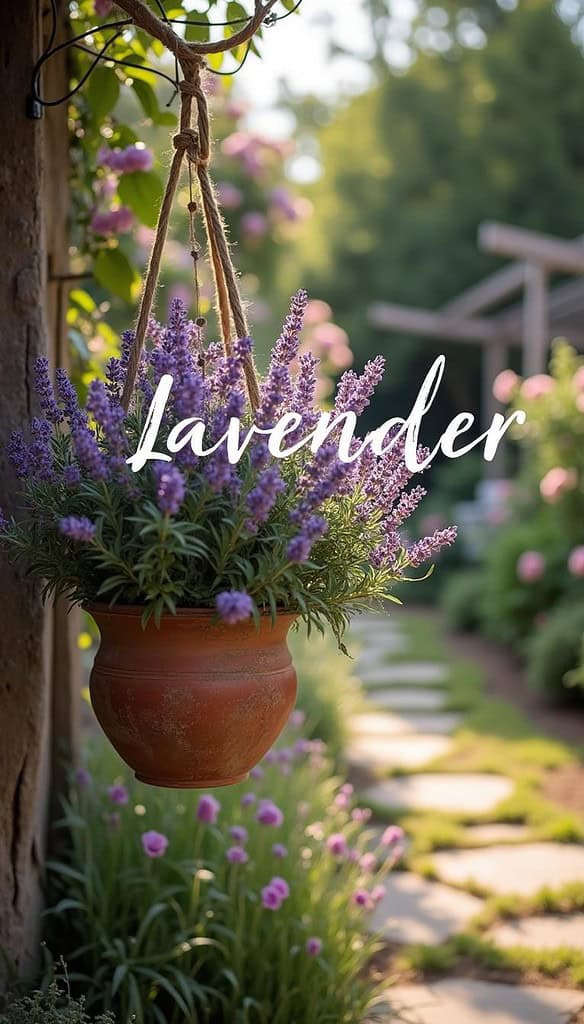
Who doesn’t love lavender? This Mediterranean beauty has been a garden favorite for centuries.
The sweet fragrance we find so calming acts as a natural mosquito repellent – talk about a win-win!
Lavender thrives in sunny spots with well-drained soil and is drought-tolerant once established.
❓ Did You Know: Lavender’s essential oils contain compounds that can repel not just mosquitoes but also flies, moths, and fleas!
3. Marigolds (flowers that repel mosquitoes)
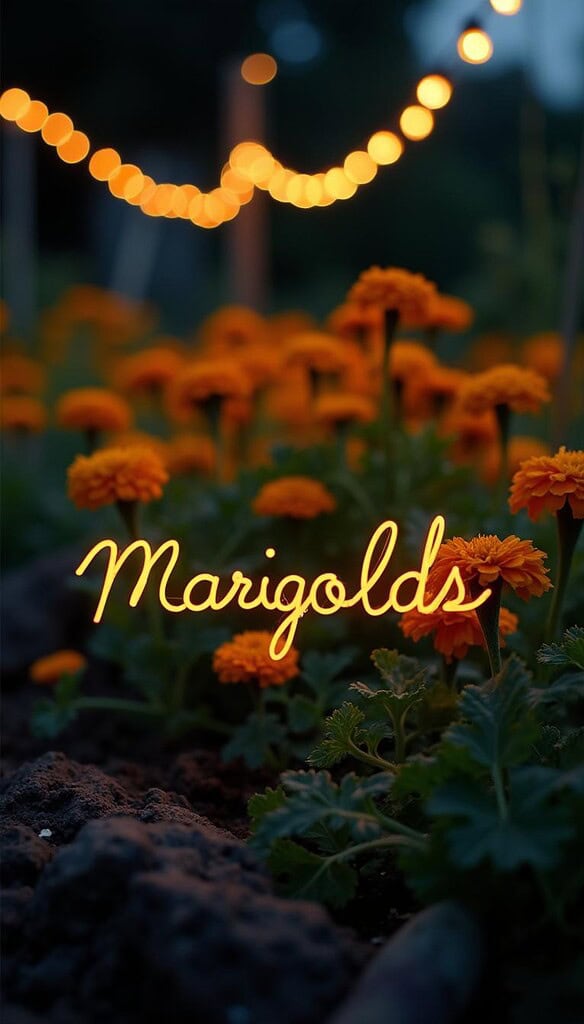
Bright and cheery marigolds aren’t just pretty faces in your garden – they’re working hard to keep bugs away, too!
These annual flowers contain pyrethrum, a compound used in many commercial insect repellents.
Their distinct smell confuses mosquitoes and makes it harder for them to find you.
🔍 Consider This: Plant marigolds as borders around vegetable gardens or outdoor seating areas for both beauty and protection.
4. Basil (doubles as a herb + natural repellent)
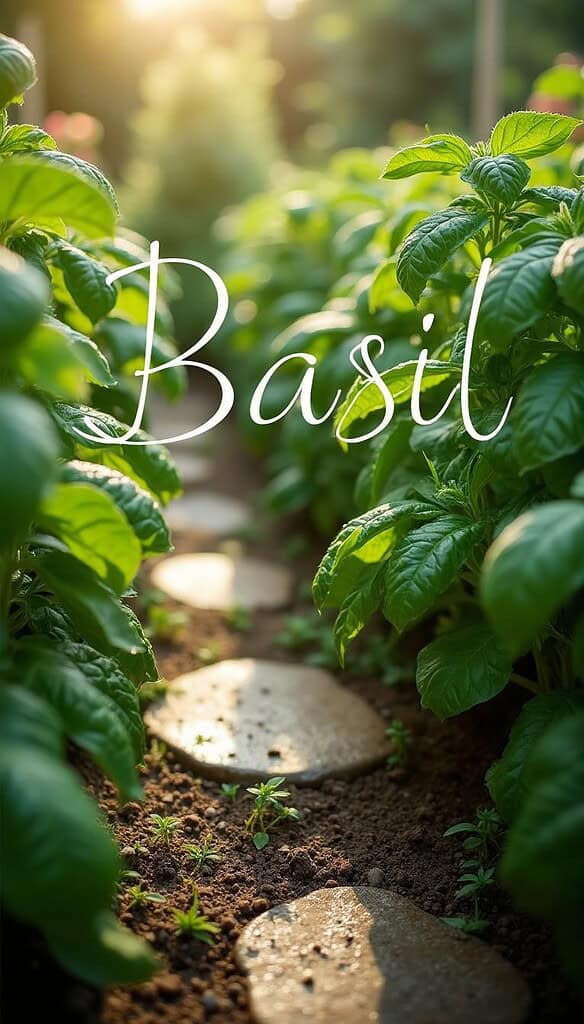
This kitchen superstar does double duty in the garden as a powerful mosquito deterrent.
All varieties of basil work, but lemon basil and cinnamon basil seem to be particularly effective against those pesky mosquitoes.
Simply brushing against basil leaves releases their mosquito-repelling oils into the air.
💡 Pro Tip: Keep a pot of basil right on your outdoor dining table; it’ll repel mosquitoes and be handy for garnishing summer dishes! 🍃
5. Lemon Balm (great for shady spots)
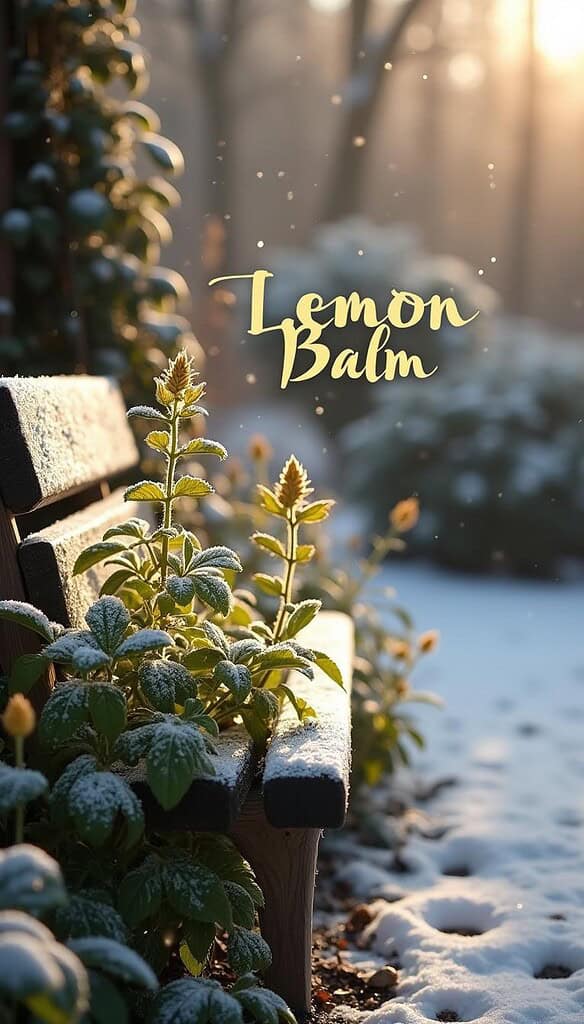
Part of the mint family, lemon balm contains high levels of citronellal, similar to what’s in citronella.
This easy-growing perennial thrives in partially shaded areas where other mosquito repelling plants might struggle.
Just crush a few leaves between your fingers to release the lemony scent mosquitoes hate.
❓ Did You Know: Lemon balm can sometimes spread aggressively, so consider planting it in containers to keep it under control.
6. Catnip (stronger than DEET in studies)
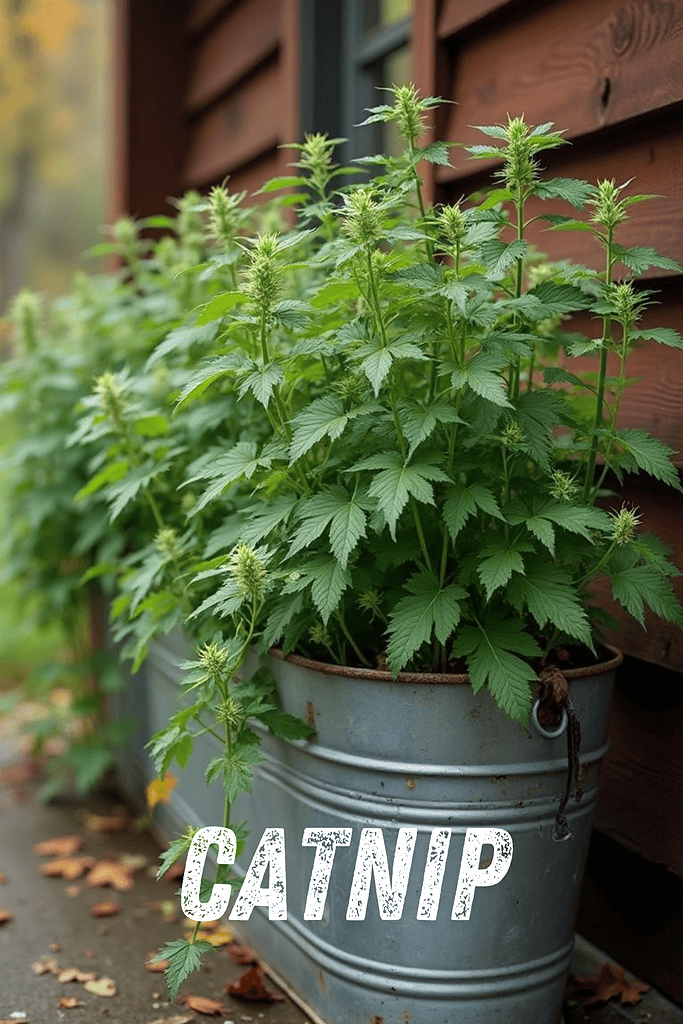
Your feline friends aren’t the only ones who have strong reactions to catnip!
Research from Iowa State University found that catnip oil is 10 times more effective than DEET at repelling mosquitoes. That’s impressive! 🐱
This easy-growing perennial contains nepetalactone, which sends mosquitoes flying in the opposite direction.
🔍 Consider This: If you have cats, be aware they might roll around in and possibly damage your catnip plants. Consider planting extra or protecting some plants with cages.
7. Peppermint (mosquitoes hate the menthol)
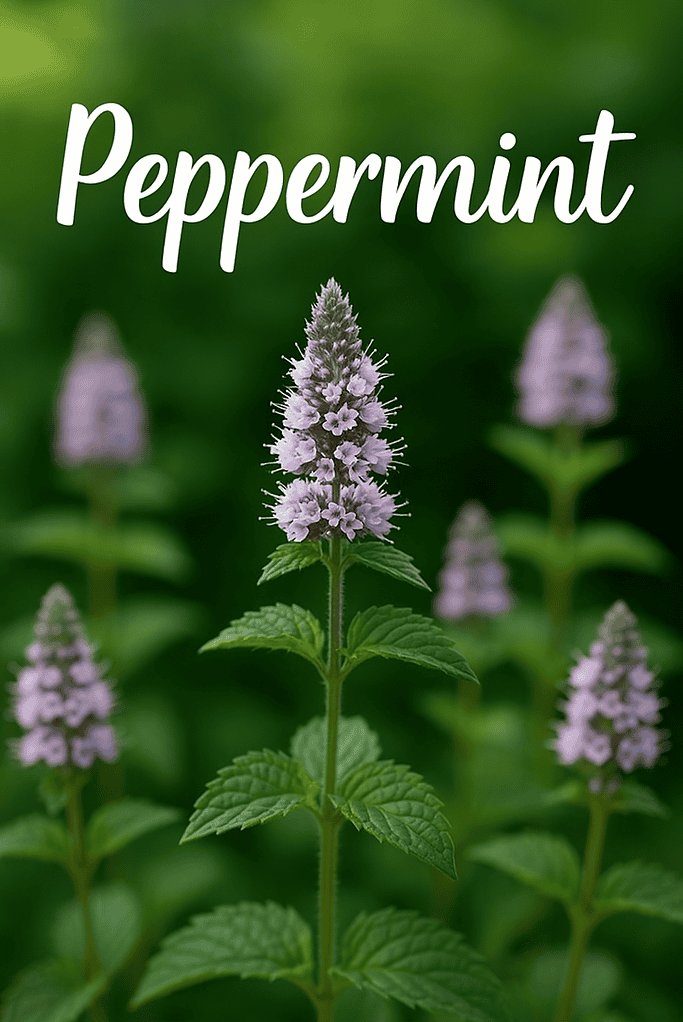
The refreshing scent of peppermint might remind you of candy canes, but mosquitoes find it completely overwhelming.
It’s the menthol content in peppermint that bugs can’t stand, making it an excellent natural repellent.
Like all mints, peppermint spreads quickly, so it’s best grown in containers to prevent it from taking over.
💡 Pro Tip: Crush a few peppermint leaves and rub them on your skin for a quick, natural mosquito repellent in a pinch!
8. Lemongrass (easy to grow in pots)
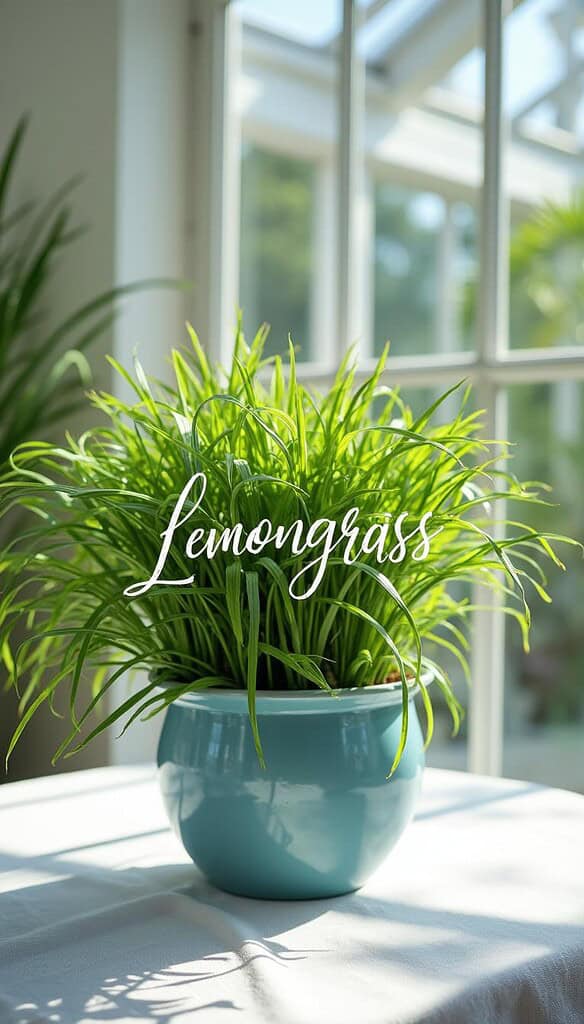
This tropical grass contains high levels of citral, the natural oil that gives it that distinctive lemony scent.
Often confused with citronella, lemongrass is actually different but works in similar ways to repel mosquitoes.
It grows beautifully in containers and can be brought indoors in colder climates during winter.
❓ Did You Know: Lemongrass is a common ingredient in Thai cooking, so you can harvest some for your favorite recipes while keeping mosquitoes away!
9. Rosemary (bonus: delicious in food!)
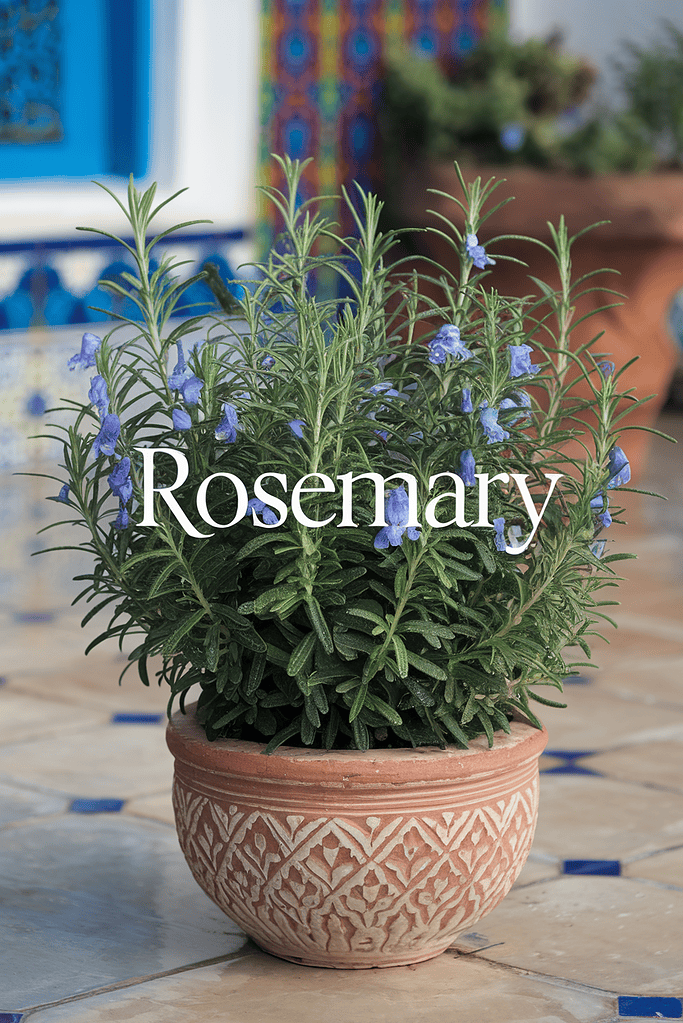
This woody perennial herb does more than season your roasted potatoes – it’s a mosquito fighter too!
Rosemary’s strong piney scent comes from oils that naturally repel mosquitoes and other flying insects.
It prefers hot, dry conditions and plenty of sunshine, making it perfect for that sunny spot in your yard.
🔍 Consider This: Rosemary can grow quite large over time, becoming almost shrubby in warm climates, providing even more mosquito protection.
10. Sage (burn it for mosquito smoke deterrent)
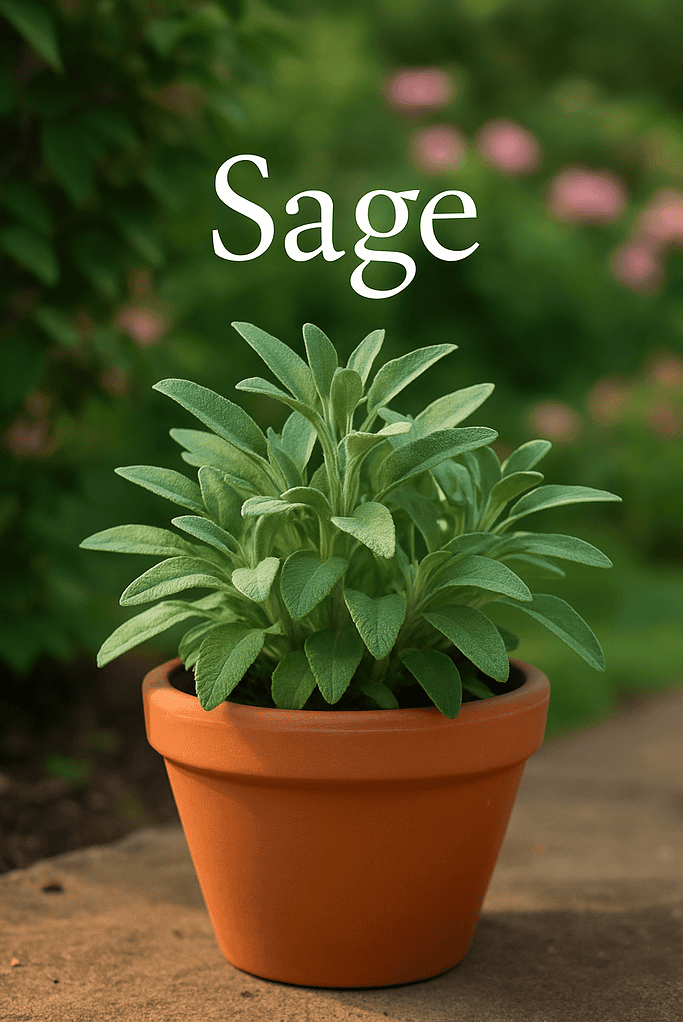
Sage has been used for centuries for everything from cooking to ceremonial purposes, including pest control.
While growing sage in your garden will provide some mosquito repellent properties, it’s even more effective when dried and burned.
The smoke from burning sage (often called smudging) creates a strong scent that quickly drives mosquitoes away. 🔥
💡 Pro Tip: For outdoor gatherings, try placing some dried sage leaves on your BBQ coals after cooking to create a natural mosquito-repelling smoke!
11. Bee Balm (pretty and powerful)
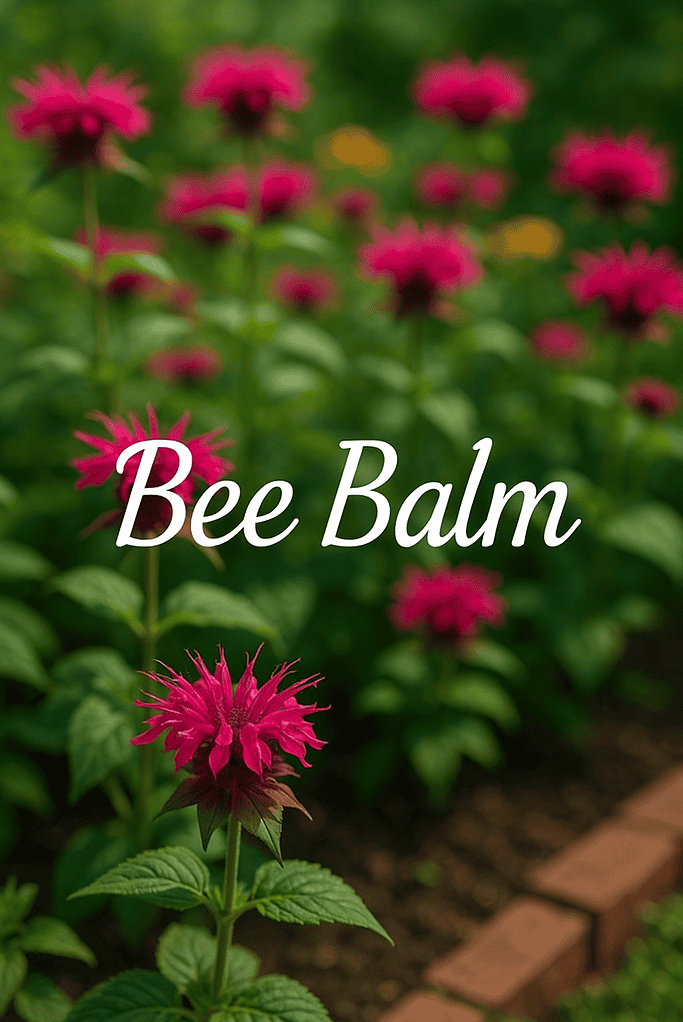
Also known as monarda, this native wildflower attracts beneficial pollinators while repelling unwanted pests.
With its showy, vibrant flowers in red, pink, or purple, bee balm adds both beauty and function to your garden.
The fragrant leaves contain natural compounds that mosquitoes avoid, making it a perfect addition to any natural pest control plan.
❓ Did You Know: Native Americans traditionally used bee balm as both a medicinal plant and a natural insect repellent.
12. Garlic (plant it near borders)
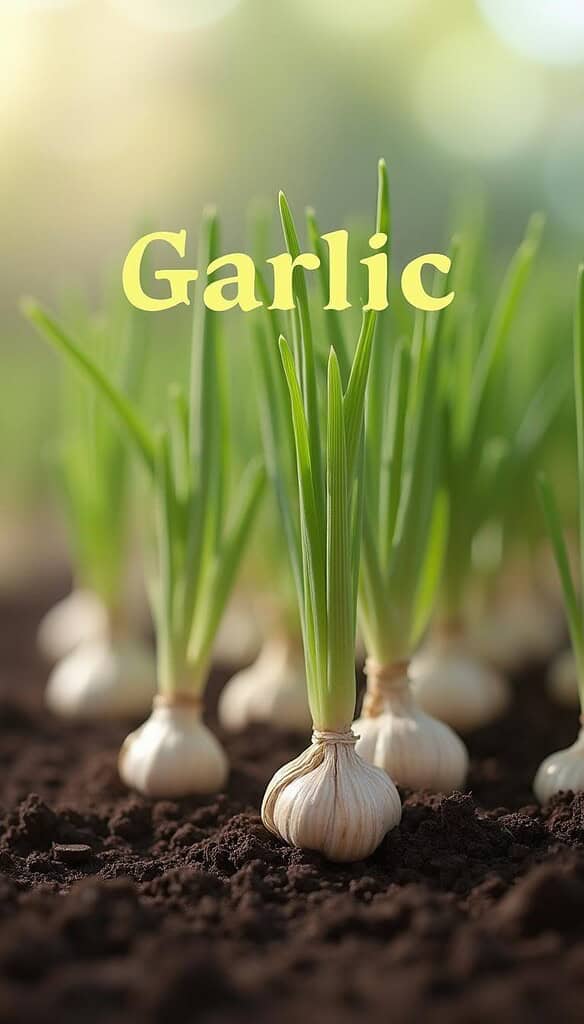
It’s not just for keeping vampires away! Garlic is a powerful mosquito deterrent.
When planted around the perimeter of your yard or garden, garlic creates a barrier that many biting insects won’t cross.
The strong sulfur compounds in garlic repel mosquitoes even before the bulbs are harvested. 🧄
🔍 Consider This: Plant garlic in fall for a dual harvest – mosquito protection all spring and summer, plus delicious garlic bulbs to harvest later!
13. Allium (ornamental flower + mosquito shield)

These dramatic, globe-shaped flowers aren’t just showstoppers in the garden – they’re also natural mosquito repellents.
Part of the same family as garlic and onions, alliums contain the same sulfur compounds that mosquitoes hate. 🌸
With their tall stems and perfectly round purple blooms, they add architectural interest while keeping pests away.
💡 Pro Tip: Plant alliums in groups of 5-7 bulbs for the most dramatic visual impact and better mosquito control.
14. Geraniums (especially citronella varieties)
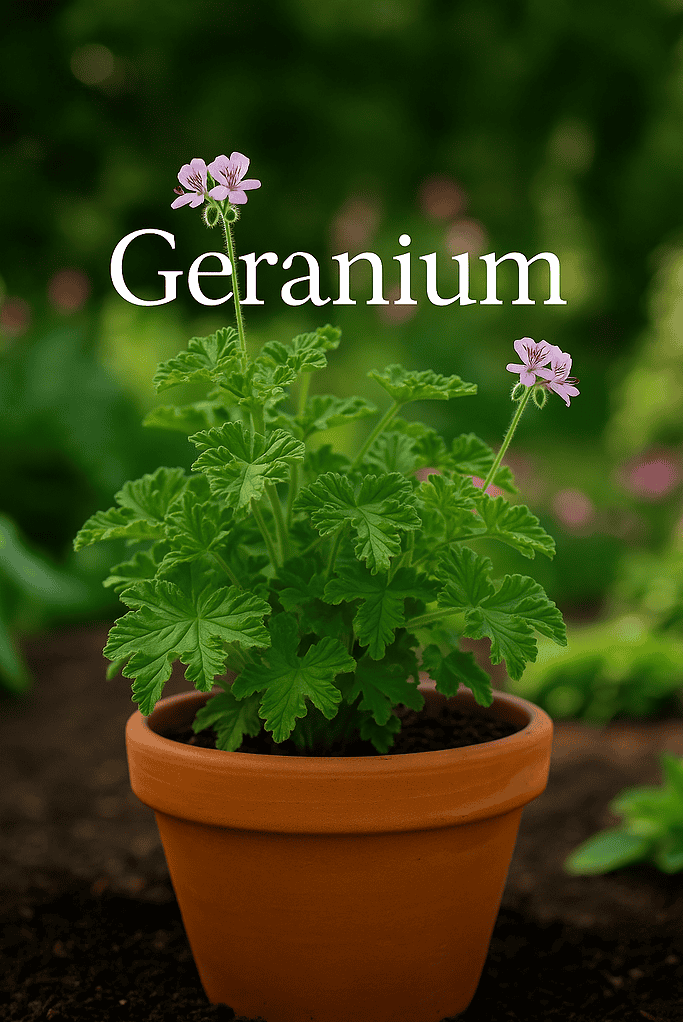
Scented geraniums, particularly the citronella variety (Pelargonium citrosum), emit a pleasant lemon-like fragrance that confuses mosquitoes.
These tender perennials work well in containers, window boxes, or hanging baskets around patios and porches.
Their pretty flowers add color while their leaves provide the mosquito-repelling benefits.
❓ Did You Know: There are over 200 varieties of scented geraniums, many with different fragrances including rose, mint, and apple!
15. Eucalyptus (strong scent to mask CO₂)
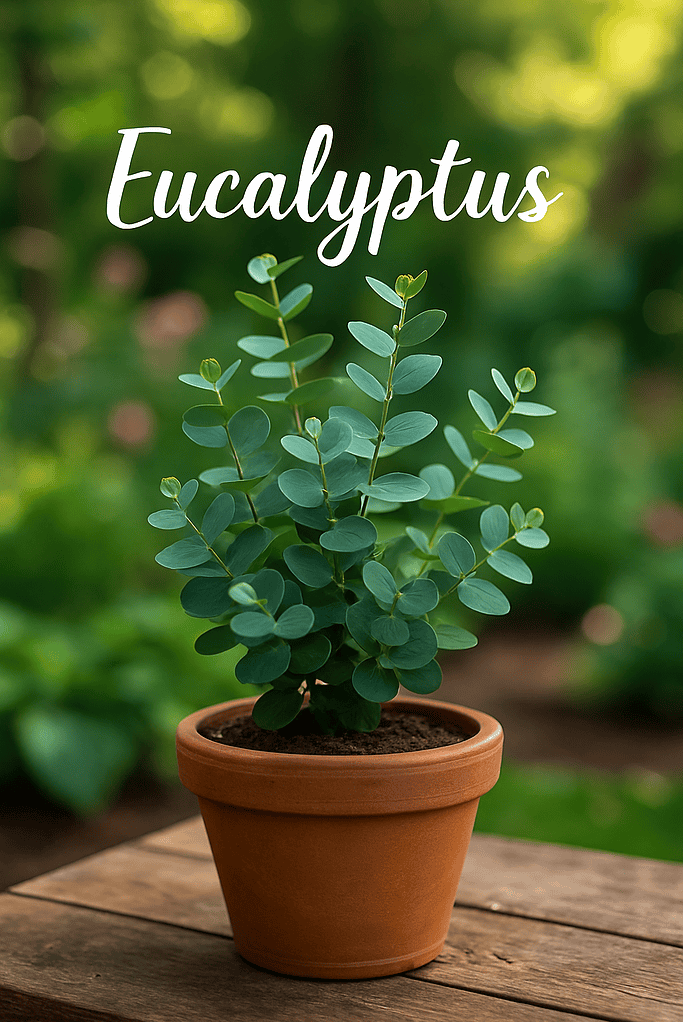
With its distinctive menthol-like fragrance, eucalyptus is highly effective at masking the carbon dioxide we exhale, which is what attracts mosquitoes to us in the first place.
While true eucalyptus trees grow quite large, lemon eucalyptus (Corymbia citriodora) can be grown in pots and brought indoors during winter in colder regions.
The oil from this plant is so effective that it’s used in many natural commercial repellents.
🔍 Consider This: In warm climates where eucalyptus can be planted in the ground, it grows extremely quickly and can provide significant mosquito protection within a few seasons.
Mosquito Repelling Planter Ideas
Now that you know the best plants for keeping mosquitoes away, let’s talk about how to combine them for maximum impact!
How to mix herbs + flowers for maximum impact
When designing mosquito repelling plant containers, consider both aesthetics and function.
Creating beautiful containers is all about layering different scents and heights for both beauty and function.
Try this winning combination in a large pot:
- Tall lemongrass or citronella in the center
- Lavender and rosemary in the middle
- Creeping thyme or mint spilling over the edges
This “thriller, filler, spiller” approach creates a gorgeous container that packs a powerful mosquito-repelling punch! 🌱
💡 Pro Tip: Place these mixed mosquito repelling plants in key areas where people gather – near seating areas, around the BBQ, or flanking doorways.
Best patio and porch combos (bug repellent plants patio)
Your patio or porch is where you’ll likely spend most of your outdoor time, so protect it well with mosquito repelling plants!
For a mosquito-free seating area, try these arrangements:
- Citronella and eucalyptus in large pots for height
- Potted rosemary and sage on tables
- Hanging baskets of lemon balm and trailing geraniums
- Window boxes filled with marigolds and catnip
Remember that creating layers of scent is key – the more varieties of mosquito repelling plants you include, the stronger your natural mosquito barrier will be.
❓ Did You Know: Crushing or bruising the leaves of mosquito repelling plants releases more of their essential oils, making them even more effective. Consider gently brushing your hand across these plants before outdoor gatherings.
Pro Tips for Keeping Mosquitoes Away All Season (repel mosquitoes outdoors)
Your mosquito repelling plants are just one part of a comprehensive strategy to keep your yard bug-free!
Set up a small outdoor fan near your seating area. 🌀
Mosquitoes are weak fliers, and even a gentle breeze makes it difficult for them to land, helping to keep your space comfortable and bug-free!
Water maintenance, shade trimming, and citronella hacks
To maximize the effectiveness of your mosquito repelling plants, position them strategically around seating areas.
Mosquitoes need standing water to breed, so eliminating water sources is crucial:
- Empty any containers that collect rainwater at least once a week
- Keep gutters clean and properly draining
- Change bird bath water frequently
- Fix leaky outdoor faucets
- Consider treating rain barrels with mosquito dunks
Mosquitoes also love shade and high humidity, so:
- Trim bushes and tree branches to increase sunlight and air circulation
- Mow your lawn regularly to reduce hiding spots
- Prune dense vegetation near seating areas
💡 Pro Tip: Try this DIY citronella hack – take cuttings from your citronella plant, crush them slightly, and place them in small vases of water around your outdoor seating area for an instant mosquito-repelling boost!
What to avoid planting near your mosquito barrier
While focusing on what to plant, don’t forget that some plants can actually attract mosquitoes!
Avoid these near your outdoor living spaces:
- Water-loving plants that create damp conditions
- Plants with cupped flowers that collect water
- Dense ground covers that retain moisture
- Plants that require frequent watering
🔍 Consider This: Some plants like Joe-Pye weed, black-eyed Susans, and lily of the valley can attract beneficial insects that eat mosquitoes. Place these strategically in other parts of your yard to create a balanced ecosystem.
Final Thoughts + Reader Takeaway
Creating a garden with mosquito repelling plants isn’t just about keeping bugs away – it’s about crafting a beautiful, fragrant, and functional outdoor space that enhances your life. 🌼
My favorite combinations include lavender, citronella, and basil for sunny areas, with lemon balm and catnip filling in shadier spots. 🌱
Remember that no natural solution is 100% effective on its own, but layering these mosquito repelling plants throughout your yard creates a powerful defense system that reduces mosquito populations significantly.
❓ Did You Know: Research shows that using a combination of mosquito repelling plants, elimination of standing water, and occasional use of fans in outdoor areas can reduce mosquito activity by over 80%!
Have you tried any of these mosquito repelling plants in your garden? Which ones worked best for you?
Share your experiences in the comments below – I’d love to hear your success stories and tips for keeping those pesky mosquitoes away naturally!
Happy gardening, and enjoy your mosquito-free outdoor space! 🌿✨
Leave a Reply